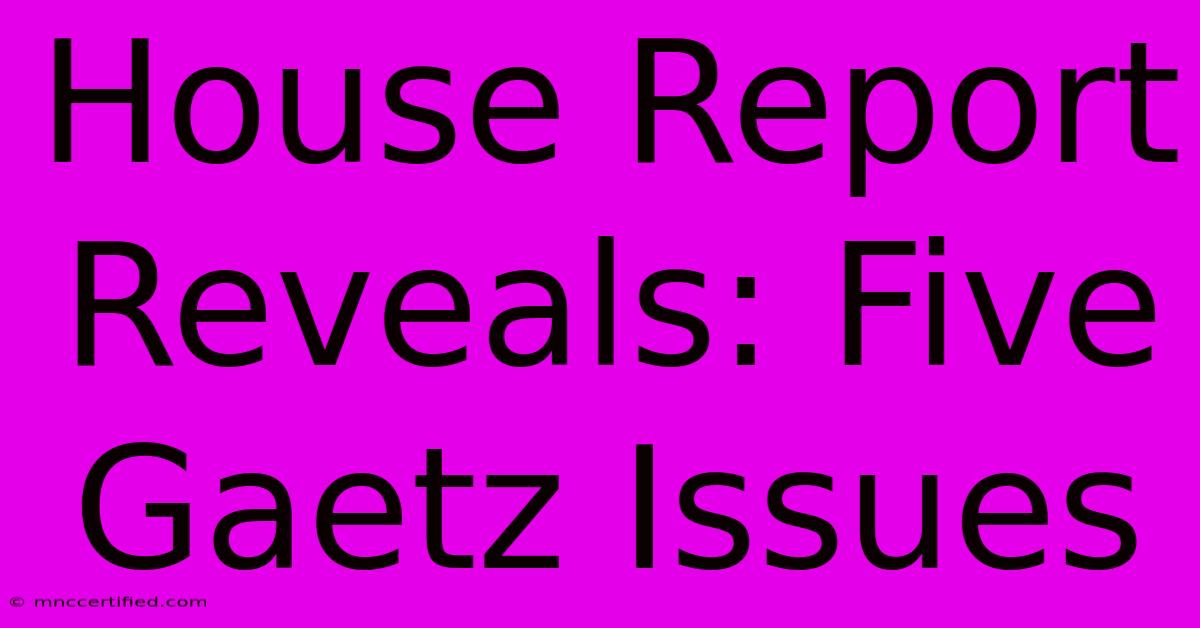House Report Reveals: Five Gaetz Issues

Table of Contents
House Report Reveals: Five Key Issues Facing Rep. Matt Gaetz
The recently released House Oversight Committee report on Representative Matt Gaetz has ignited a firestorm of controversy. While the report doesn't result in criminal charges, it details several serious allegations and ethical concerns surrounding the Florida congressman. This article delves into five key issues highlighted in the report that continue to dominate headlines and fuel ongoing debate.
1. Allegations of Sexual Misconduct and Abuse of Power: A Central Focus
The report's most significant focus is on allegations of sexual misconduct involving Representative Gaetz. These accusations, some stemming from witness testimony, allege a pattern of behavior involving underage girls and the potential abuse of his official position to facilitate encounters. While the report doesn't definitively prove criminal wrongdoing, the detailed accounts raise serious ethical questions about his conduct and fitness for public office. The lack of criminal charges doesn't diminish the gravity of these allegations, which continue to be subject to public scrutiny and debate. The committee's findings underscore the need for thorough investigation into such claims and the importance of accountability for those in positions of power.
2. Financial Irregularities and Campaign Finance Violations: Scrutinizing the Funds
The House report also scrutinizes Gaetz's financial dealings. Allegations of misuse of campaign funds and potential violations of campaign finance laws are detailed, raising concerns about transparency and ethical conduct. Specific instances cited in the report warrant further investigation and could lead to civil penalties or further legal action. The report highlights the need for increased transparency and stricter regulations surrounding campaign finance to prevent misuse of public funds and ensure accountability for elected officials. This aspect of the investigation has implications beyond Gaetz himself, prompting discussions about broader campaign finance reform.
3. Relationships with Lobbyists and Potential Conflicts of Interest: A Web of Influence
The report also explores Gaetz's relationships with various lobbyists and potential conflicts of interest arising from these associations. The committee's findings suggest a possible blurring of lines between official duties and personal enrichment, prompting concerns about the influence of special interests on legislative decisions. Understanding the nature and extent of these relationships is crucial for evaluating the integrity of the legislative process and ensuring the public interest is prioritized over private gain. This issue underscores the ongoing challenge of regulating lobbying activities and preventing undue influence on policymakers.
4. Use of Official Resources for Personal Gain: Misuse of Power?
The report further details allegations of Representative Gaetz using official resources and staff for personal gain. This misuse of taxpayer resources is a serious breach of public trust and raises concerns about ethical standards in government. Examples cited in the report could lead to further disciplinary actions, beyond the scope of the initial investigation. The findings highlight the need for stricter oversight of official resources and greater accountability for elected officials who potentially abuse their power for personal benefit. This aspect calls for greater transparency and internal controls within government agencies.
5. Lack of Cooperation with the Investigation: Obstruction of Justice?
Finally, the report notes a significant lack of cooperation from Representative Gaetz and his associates throughout the investigation. This refusal to fully participate raises concerns about obstruction of justice and further hampers efforts to get to the bottom of the allegations. The committee's inability to obtain certain information underscores the challenges investigators face when dealing with uncooperative subjects. This lack of transparency undermines the integrity of the investigation and fuels further public skepticism. The issue raises broader questions about the power of congressional investigations and the need for greater cooperation from those under scrutiny.
Conclusion:
The House report on Representative Matt Gaetz presents a complex and troubling picture. While it doesn't lead to criminal charges, the documented allegations and ethical concerns remain significant. The findings call for increased transparency, stronger ethical standards, and stricter enforcement mechanisms to prevent similar situations in the future. The ongoing public debate surrounding these issues emphasizes the critical importance of accountability for elected officials and the necessity of maintaining public trust in government. The long-term implications of this report extend beyond Gaetz himself, prompting a larger conversation about ethical conduct and accountability within the political system.

Thank you for visiting our website wich cover about House Report Reveals: Five Gaetz Issues. We hope the information provided has been useful to you. Feel free to contact us if you have any questions or need further assistance. See you next time and dont miss to bookmark.
Featured Posts
-
6 25 B Nordstrom Family Acquisition
Dec 24, 2024
-
Santa Cruz Wharf Collapses 3 Workers Rescued
Dec 24, 2024
-
Woman Burned Alive Ny Murder Arrest
Dec 24, 2024
-
Assad Divorce Rumors Kremlin Responds
Dec 24, 2024
-
Trump Greenland Panama Canal Control Bid
Dec 24, 2024